The future of prompt engineering is unpredictable. No one can say for sure that it’ll definitely skyrocket. No one can either say that it will be lost. However, what one can say is that AI will evolve and only that will decide where prompt engineering will end up.
If we go with Open AI’s CEO Sam Altman’s words, prompt engineering will be an “amazingly high-leveraged skill.”
But that’s not for sure. What’s promising is that prompt engineering will be required in every job and tools we use to improve our work. More specifically, things will be more AI-dependent, and to interact with AI, we would need prompts. They could be written prompts, electrical signals from our minds and whatnot.
AI will be there, and prompt engineering is just a start. Through this post, we will see how the future of prompt engineering will evolve and what you can expect from AI tools.
If you’re ready, then let’s begin the uncovering.
But First, Let’s Look at Where the AI and Prompt Engineering Has Made the Impact
Since the launch of ChatGPT in 2022, the meaning of AI has changed. Now, it’s not only limited to super advanced robots anymore. Instead, it’s everything now, whether we talk about marketing and sales, design and crafting, medical sciences and whatnot.
Or, perhaps ChatGPT is the start of the super-advanced robots we see in the movies.
If we look at the ChatGPT’s response on how transformative generative AI will be for business in the future, this is what we get,
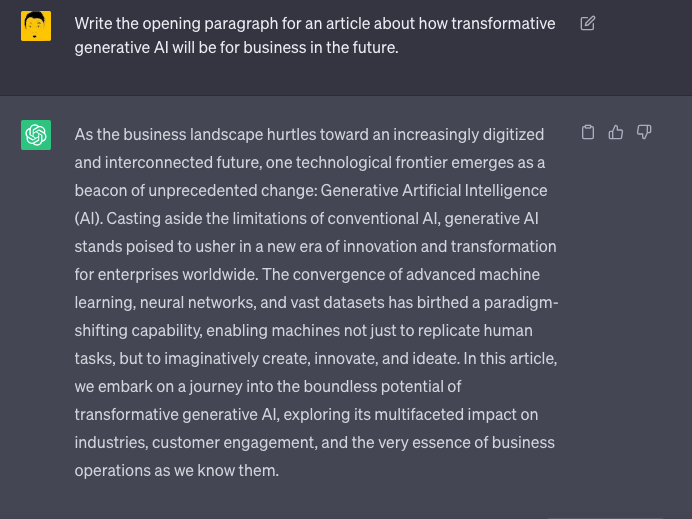
It’s not bad and shows promising signs of AI’s role in the future of the job market. If we look at McKinsey & Company’s insight on AI’s impact on different industries, this is what we can anticipate.

With this, it’s clear that AI truly opens the door to more opportunities, and to utilize those, one would definitely need help from prompt engineering.
The Future of Creativity: How GPT Prompt Engineering Will Unlock Our Creative Potential
The future job market will definitely have a role for AI prompt engineers because, in addition to creativity, it expands the horizon of results in different domains. Through the help of AI and prompt engineering, one can see,
- Speed.
- Accuracy.
- Uniqueness.
- Cost reduction.
- And Skill improvements.
Considering the above aspects, the future of prompt engineering steps into a very unpredictable state where one would grow if one keeps up with the latest changes and remembers the following presumptions.
Prompt Engineering Will Be A Must-Have Skill
Just like knowing how to use a computer has become a must-have skill in any corporate job, prompt engineering will become something like that. Different tools will be equipped with AI; hence, an employee or professional must know how to write prompts to operate them effectively.
If we look at the market trends, each and every industry is going through a shift in AI. It won’t matter whether your day job requires you on the field or in a cubicle; you should know how AI works appropriately. If we take the words of many AI experts, “In the coming 12 years, AI will enable all sorts of professions to do their work more efficiently…”
This will significantly affect the input and output for a given condition, and prompt engineering will have an essential role in it.
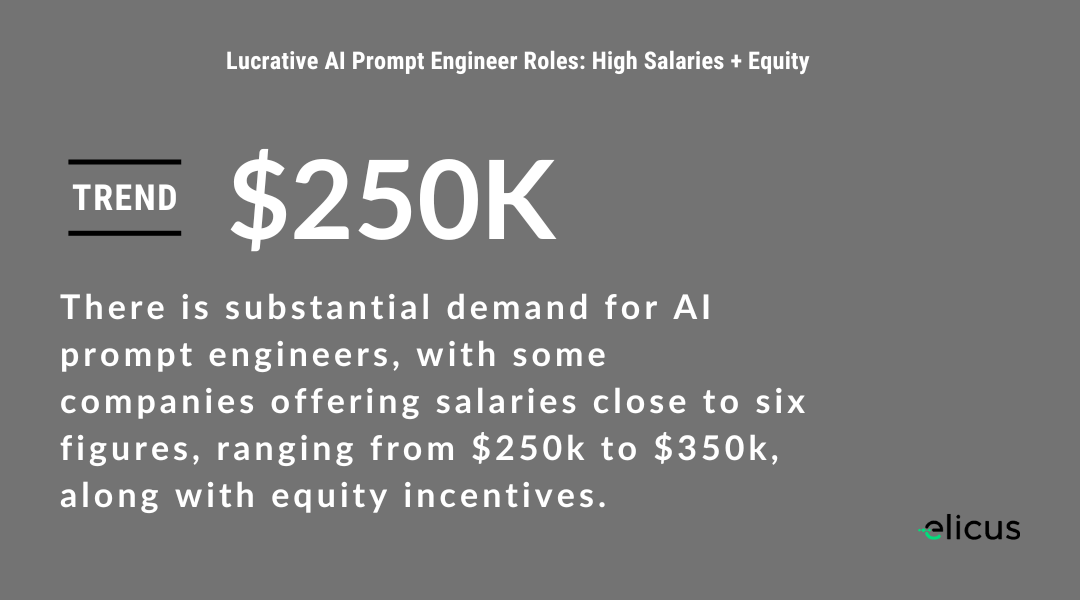
Different organizations are welcoming AI and, with that, prompt engineers. By looking at one of Time’s posts, there’s a huge demand for AI prompt engineers with salaries near six figures. Some companies are looking to hire prompt engineers at a pay of around $250k to $350k + equity.
There’s huge trust in AI and its related skills, which will impact the big world of tech or non-tech.
Less Need of the Prompts, But Human Decision Will Be the Key
AI tools like ChatGPT and Bard aren’t that smart, even ChatGPT 4. They are still evolving. Hence, one needs to structure prompts more effectively. One must have perfect skills to write prompts. But, as these tools will take the shape of a more advanced helping tool, users would not need to write prompts. They will become more autonomous and adaptive.
These AI tools beforehand will provide choices or solutions. Yet, these tools will not make decisions on their own. A decision would be made upon the user’s will.
Just like Jarvis in the Iron Man movie. The super-intelligent artificial intelligence tells Tony Stark of various alternatives for a particular situation, and Tony decides which one to go with most of the time. That’s what will happen while prompting the AI tools. They would analyze the situation on their own, but prompt engineers will make the choice of what to do.
More User-friendly AI Tools, Less Need to Structure the Prompts
The future of prompt engineering will need prompts that would be less structured. You don’t have to provide all the information by writing or using the voice. You can simply describe what you want the application to do in plain English.
Furthermore, the tools will offer a more user-friendly approach where you can guide them in the right direction by automatically using the prompts they generate.
The conversation will go from you initiating with a basic prompt; if it’s lacking the information, the AI tools will ask for it and provide you with choices that can be applied. Currently, AI tools like Grammarly, ProWritingAid and Bard’s integration to the GDocs offer you pre-configured prompts like the following,
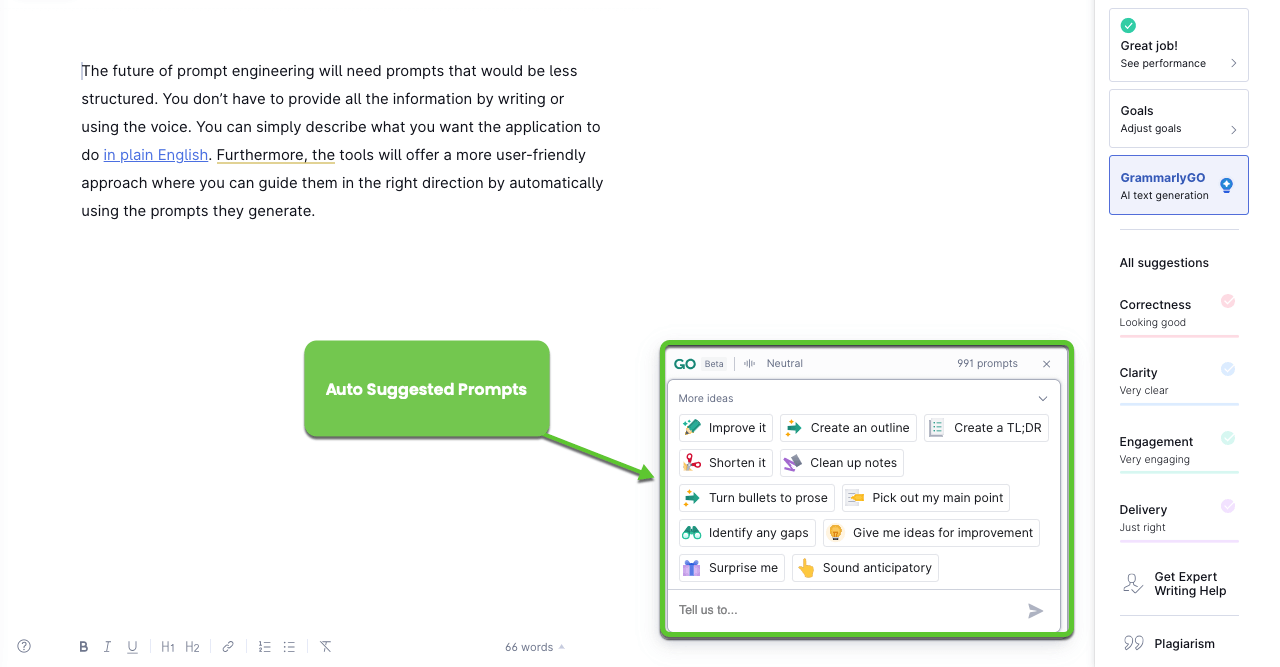
Grammarly Prompts
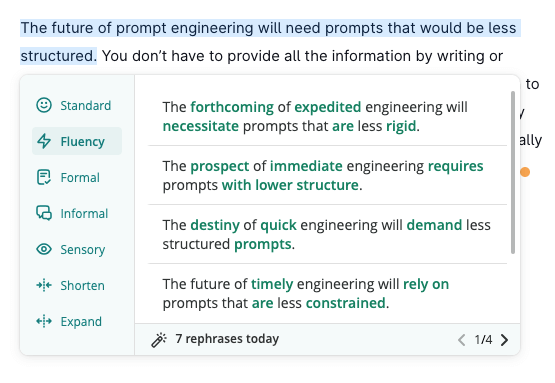
ProwritingAid Prompts
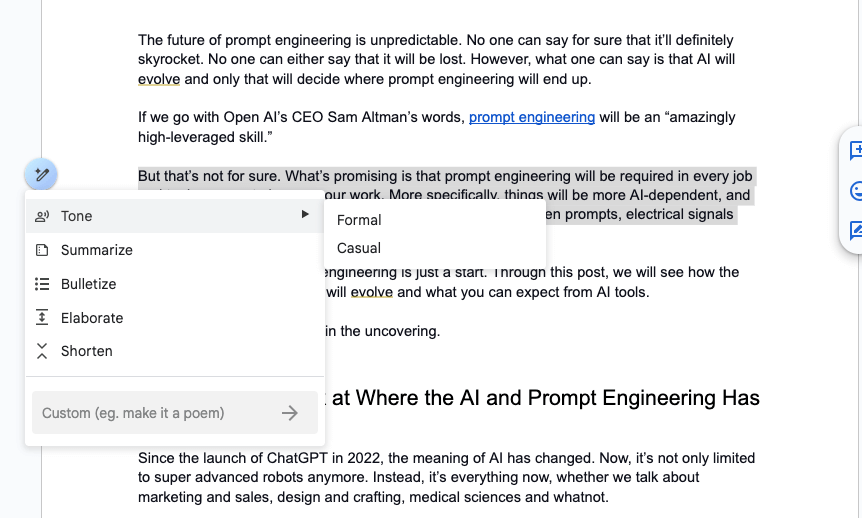
Bard AI’s Google Docs Prompts
Effective Results Through the Knowledge of Prompt Engineering
As of now, prompt engineering helps an individual crack the AI tools and get the desired response or results. However, generating accurate responses will be much easier as the technology progresses with evolved models and their user-friendliness. Not only would it be easier, but users would find more effective results compared to the current dynamics.
Individuals by using prompts will be able to fine-tune their demands, and as the AI tools will have the ability to learn from little to nothing, they will provide the best results with no doubt. Prompt engineering will make AI tools work seamlessly, fast and accurately.
You can say that in the future of prompt engineering, using prompts will be an add-on for AI tools to do their job more effectively. And if one knows how to do it, then they’ll have an upper hand compared to individuals who don’t.
This extensive database of study papers on prompt engineering puts a spotlight on prompt engineering and how it would affect the future.
If you want to dive deep, we suggest you look at those papers.
Final Thoughts
So, that’s our take on the future of prompt engineering. Tools will evolve and become part of every industry we know now. Looking at the current scenario, for the next 5 years or so, prompt engineering will be the medium through which users can interact with the AI tools. Hence, a potential for an individual in the future of the job market.
If you’re looking to perfect your skills and make the most of AI tools like ChatGPT, Bard and Bing AI, check out this blog post on becoming a successful prompt engineer.
We hope it will help you in the best way possible.

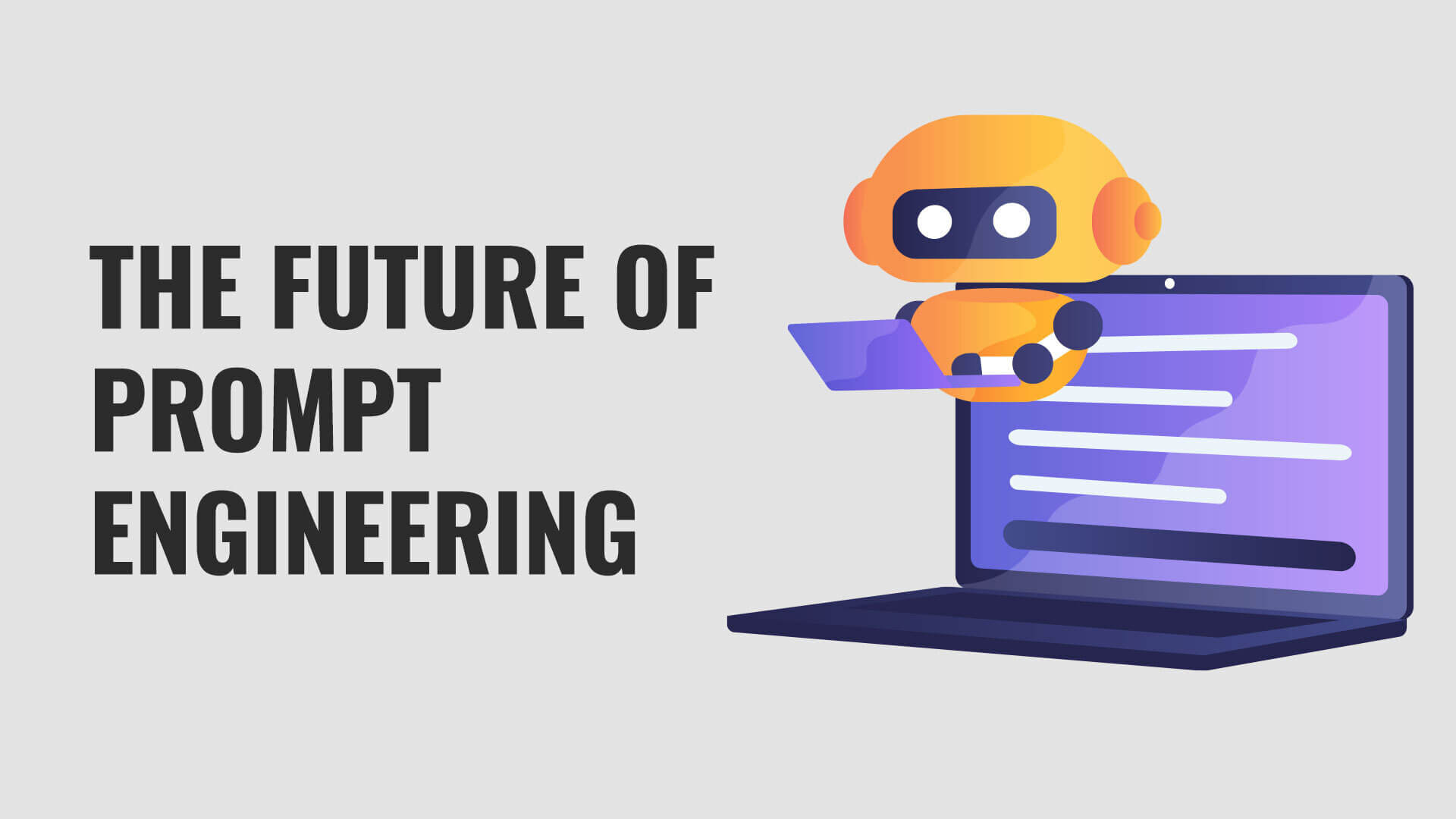

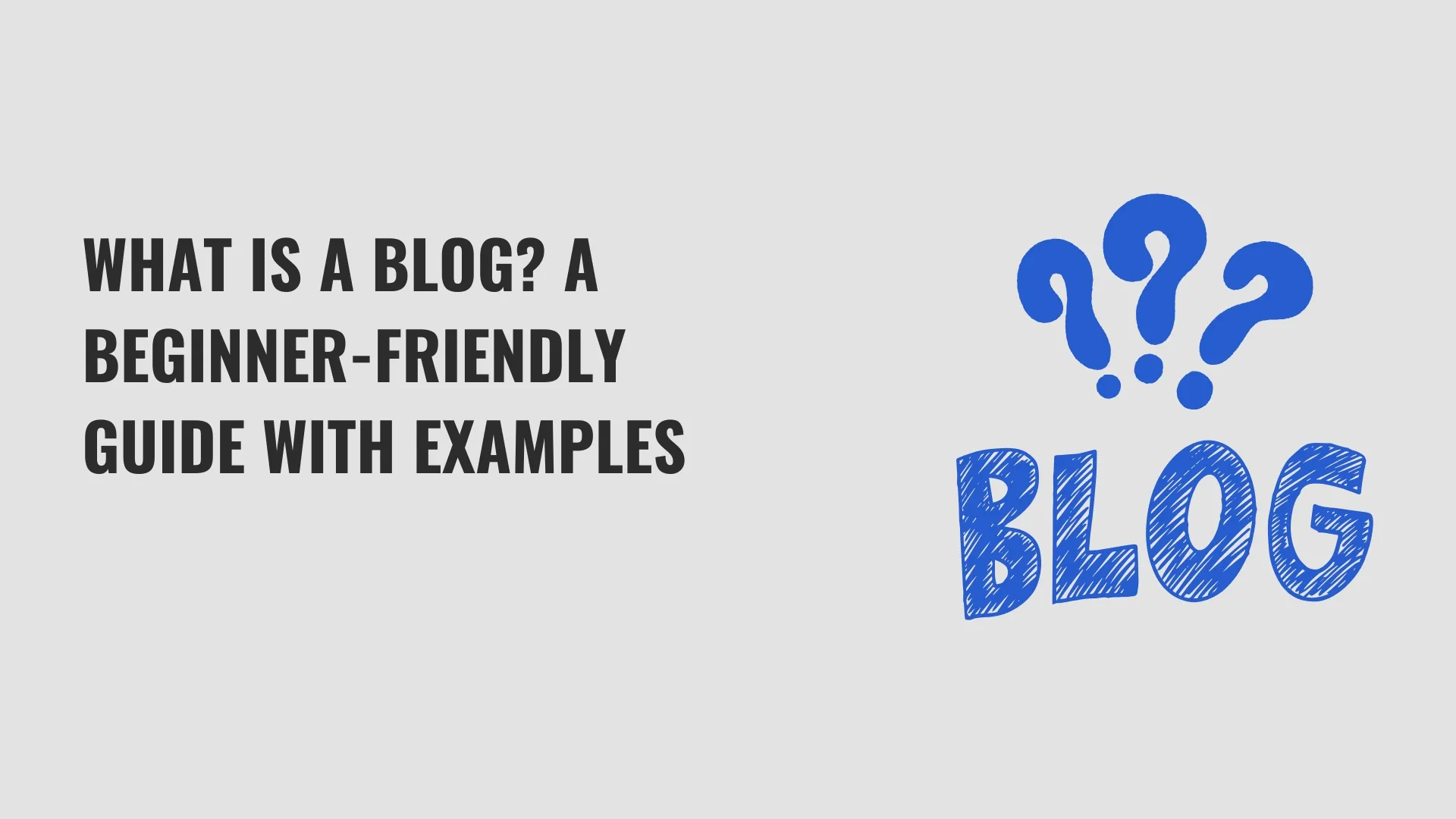




0 Comments